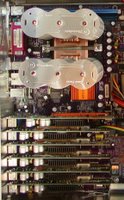 Linux is a multi-tasking, multi-user operating system. Which means, more than one person can use the OS at the same time each running multiple applications simultaneously. And the number of applications that can be run by each user is only limited by the hardware on which Linux is installed. One area where this feature of Linux is put to good use is in the thin client technology, where there is a sufficiently powerful master server which hosts the Linux OS and there are multiple stripped down versions of a PC which contains just the motherboard with enough memory, a graphics card, network card and no hard disk. These stripped down versions of the PC, also called dumb terminals, get their display from the master server and all the processing is also done on the master server.
Linux is a multi-tasking, multi-user operating system. Which means, more than one person can use the OS at the same time each running multiple applications simultaneously. And the number of applications that can be run by each user is only limited by the hardware on which Linux is installed. One area where this feature of Linux is put to good use is in the thin client technology, where there is a sufficiently powerful master server which hosts the Linux OS and there are multiple stripped down versions of a PC which contains just the motherboard with enough memory, a graphics card, network card and no hard disk. These stripped down versions of the PC, also called dumb terminals, get their display from the master server and all the processing is also done on the master server.Now if you are setting this up in a very small area, you can further cut costs by doing away with the individual mother board and memory by connecting the input and output devices directly to the master server. This is exactly what Bob Smith - an electronics hobbyist and Linux programmer - and his team accomplished. He set up a Linux system which allowed upto six people to use it at the same time. He used standard USB keyboards and mice and the six monitors were connected to individual PCI graphics cards. A very good feat indeed.
Now that doesn't mean he hadn't run into problems. He claims the system is a bit unstable in that he was getting a kernel oops when ever a user logged out. Nevertheless a very good project which can find uses in small cybercafes or even homes where you have a need for more than one computer but is hard put to buy a new one. For further details, you may read the original article.
What is a kernel oops ?
An oops report is basically just the dumping of information by the kernel when it enocounters a serious problem. The problem can be a code related bug such as dereferencing a NULL pointer, accessing out of bounds memory, and so on. Or it could be because of faulty hardware. The oops report is generated by the kernel to help the end user debug, locate, and fix the problem. Some times when a oops occurs, the system may seem to continue running normally, but is likely to be in an unstable state.
What is a kernel oops ?
An oops report is basically just the dumping of information by the kernel when it enocounters a serious problem. The problem can be a code related bug such as dereferencing a NULL pointer, accessing out of bounds memory, and so on. Or it could be because of faulty hardware. The oops report is generated by the kernel to help the end user debug, locate, and fix the problem. Some times when a oops occurs, the system may seem to continue running normally, but is likely to be in an unstable state.



3 comments:
I was just curious, what version of Linux do you run? I have been running Ubuntu since November when I got started with Linux, but I installed Debian Sarge on a new partition last night.
there is a neat thin client technology out there that uses linux: http://www.thesymbiont.com/
Jeremiah,
I usually use Ubuntu on a regular basis. But I have also installed two other linux distributions (gentoo being one of them) in other partitions on my machine and I multi-boot between them. That makes it a total of 5 OSes including windows XP and freeBSD.
Post a Comment